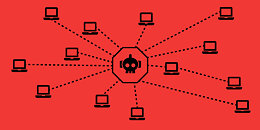Raevenlord
News Editor
- Joined
- Aug 12, 2016
- Messages
- 3,755 (1.20/day)
- Location
- Portugal
| System Name | The Ryzening |
|---|---|
| Processor | AMD Ryzen 9 5900X |
| Motherboard | MSI X570 MAG TOMAHAWK |
| Cooling | Lian Li Galahad 360mm AIO |
| Memory | 32 GB G.Skill Trident Z F4-3733 (4x 8 GB) |
| Video Card(s) | Gigabyte RTX 3070 Ti |
| Storage | Boot: Transcend MTE220S 2TB, Kintson A2000 1TB, Seagate Firewolf Pro 14 TB |
| Display(s) | Acer Nitro VG270UP (1440p 144 Hz IPS) |
| Case | Lian Li O11DX Dynamic White |
| Audio Device(s) | iFi Audio Zen DAC |
| Power Supply | Seasonic Focus+ 750 W |
| Mouse | Cooler Master Masterkeys Lite L |
| Keyboard | Cooler Master Masterkeys Lite L |
| Software | Windows 10 x64 |
Microsoft today announced it was part of a global operation meant to disrupt the world's largest online criminal network. Dubbed Necurs, the network functioned as a botnet - a number of computers infected by malware or otherwise malicious software that are functioning on behalf of a botmaster. The botmaster is basically akin to an administrator - but for nefarious purposes.
Thought to be controlled by criminals based in Russia, Necurs spanned more than nine million computing devices across 35 countries, making it one of the largest spam email threat ecosystems known to authorities - besides being used for pump-and-dump stock scams, fake pharmaceutical spam email and "Russian dating" scams. Necurs was such a well-oiled machine that it was seen sending 3.8 million spam messages to over 40 million targets across a 58-day long time frame in the investigation.


Bringing Necurs down took eight years of tracking, planning, and a joint effort between the judicial system and key technology players. These efforts culminated, according to Microsoft, with the company being enabled to take control of U.S.-based infrastructure Necurs uses to distribute malware and infect victim computers by a judicial order. The idea - and planned attack vector - was to disrupt Necurs operations in their currently active domains, whilst also breaking the organization's algorithm that enabled it to constantly generate new domains for future exploits.
The company also added that "Microsoft reported these domains to their respective registries in countries around the world so the websites can be blocked and thus prevented from becoming part of the Necurs infrastructure. By taking control of existing websites and inhibiting the ability to register new ones, we have significantly disrupted the botnet."
Microsoft is also partnering with Internet Service Providers (ISPs) and others around the world to rid their customers' computers of malware associated with the Necurs botnet - a remediation effort global in scale and involving collaboration with partners in industry, government and law enforcement via the Microsoft Cyber Threat Intelligence Program (CTIP).
View at TechPowerUp Main Site
Thought to be controlled by criminals based in Russia, Necurs spanned more than nine million computing devices across 35 countries, making it one of the largest spam email threat ecosystems known to authorities - besides being used for pump-and-dump stock scams, fake pharmaceutical spam email and "Russian dating" scams. Necurs was such a well-oiled machine that it was seen sending 3.8 million spam messages to over 40 million targets across a 58-day long time frame in the investigation.


Bringing Necurs down took eight years of tracking, planning, and a joint effort between the judicial system and key technology players. These efforts culminated, according to Microsoft, with the company being enabled to take control of U.S.-based infrastructure Necurs uses to distribute malware and infect victim computers by a judicial order. The idea - and planned attack vector - was to disrupt Necurs operations in their currently active domains, whilst also breaking the organization's algorithm that enabled it to constantly generate new domains for future exploits.
The company also added that "Microsoft reported these domains to their respective registries in countries around the world so the websites can be blocked and thus prevented from becoming part of the Necurs infrastructure. By taking control of existing websites and inhibiting the ability to register new ones, we have significantly disrupted the botnet."
Microsoft is also partnering with Internet Service Providers (ISPs) and others around the world to rid their customers' computers of malware associated with the Necurs botnet - a remediation effort global in scale and involving collaboration with partners in industry, government and law enforcement via the Microsoft Cyber Threat Intelligence Program (CTIP).
View at TechPowerUp Main Site


 , that was relevant in 2005-2012.
, that was relevant in 2005-2012. 



